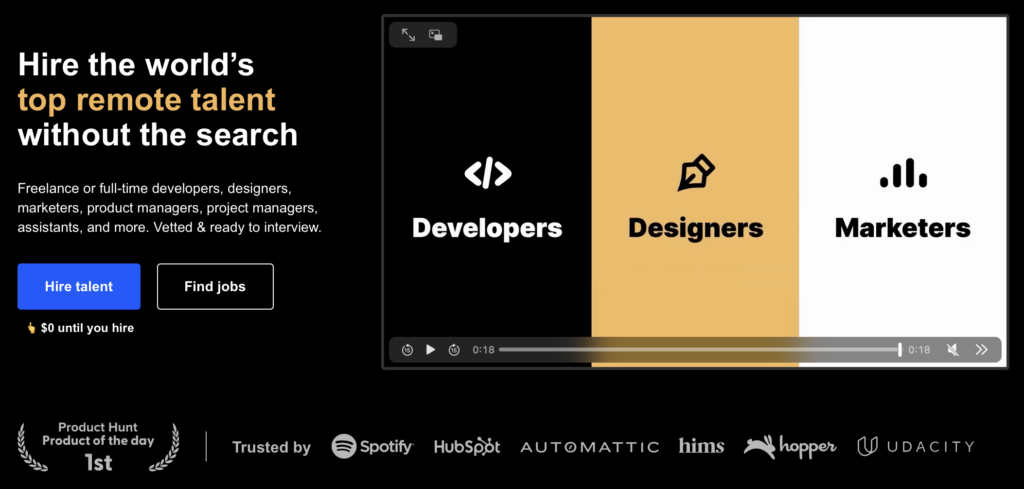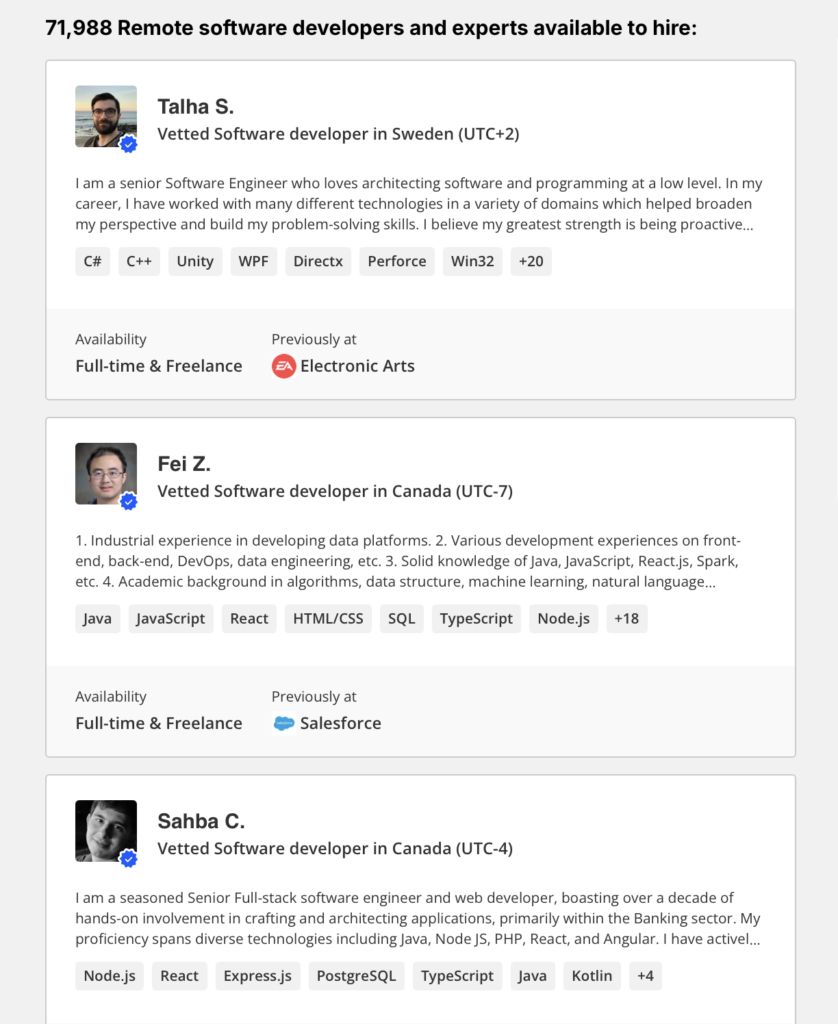Hiring developers in 2025 remains hilariously difficult. I say “hilariously” because the alternative is crying into your keyboard while reviewing the 47th resume claiming “passionate problem-solver” status.
Arc.dev positions itself as the solution to this widespread misery, promising access to the “top 2%” of global talent through its AI-powered vetting process. Bold claim. But does it hold up when the marketing gloss wears off?
For the past month, I’ve collected unfiltered stories from people who’ve used its service. This isn’t a regurgitation of its features page or a vague “they seem pretty good” assessment.
You deserve better than that, especially when your project deadlines and budget hang in the balance.
This review speaks to you—the startup founder searching for developers who won’t vanish after the first payment. The tech lead weary of candidates who padded their resumes with AI-generated experiences. Or the HR specialist who knows talent acquisition isn’t solved with a slick interface and big promises.
I’ll break down where Arc.dev shines, where it stumbles, and why you might want to look at alternatives (like Lemon.io) for specific scenarios.
What is Arc.dev?

Arc.dev launched in 2019 as a rebrand of CodementorX, but with an interesting backstory most people miss. CodementorX wasn’t just another freelance site—it grew out of Codementor, a 2014-founded community where 300,000+ developers shared knowledge and solved problems together.
Its big, shiny promise? It’ll connect you with the “top 2%” of tech talent globally.
Arc has convinced companies like HubSpot, Splice, and Shopify to hire through them. It mostly deals with developers but also offers designers and marketers for those looking to build a complete tech team.
What makes them different from the fifty other platforms promising amazing developers? It uses AI to help screen candidates to make its vetting process more rigorous and accurate than purely human methods. The platform will help you hire someone for a quick project or a full-time position, claiming it’s both high-end and reasonably priced.
And that’s where things get interesting. Can Arc really serve caviar at hot dog prices? That’s what we’re here to figure out.
Inside Arc.dev’s Vetting Process
Arc.dev’s entire reputation rests on its vetting process. It’s the moat protecting its “top 2%” castle. So I dug into how it actually works.
Its screening happens in four main stages, combining algorithms with human judgment:
- Profile screening comes first. Arc reviews work history, tech expertise, and experience to filter out the resume padders. Basic, yes, but effective at catching the “passionate problem-solvers” who can’t actually solve problems.
- Next is the communication assessment. Candidates record video introductions or join live interviews to prove they can explain technical concepts in clear English. Necessary for remote work, where unclear communication turns small problems into project-killing monsters.
- The technical interview follows—live coding and pair programming exercises that test real development skills. No theoretical puzzles or whiteboards. They want to see how you actually build things.
- Finally, Arc runs ongoing performance monitoring and regular check-ins. It’s quality control that catches issues before they impact your project.
The process isn’t revolutionary, but it works. Just ask HubSpot and Shopify, who regularly hire through Arc. While “top 2%” might be marketing speak, its vetting does deliver consistently competent developers.
When AI Meets Hiring: The Good and the Questionable
Arc uses AI to scale its vetting. Its algorithms help them process thousands of applications efficiently, looking for patterns that might indicate quality candidates.
But coding isn’t just about patterns and known solutions. The best developers often think differently, approaching problems from unexpected angles. Can an algorithm recognize brilliant but unconventional thinking? Or does it just reward those who match predefined patterns of “good coding”?
The Human Touch: What’s Missing?
Here’s where Lemon.io takes a fundamentally different approach. While Arc embraces AI, Lemon.io doubles down on human evaluation. Our process is unapologetically manual, with experienced developers evaluating candidates through conversations and real-world problem-solving.
The difference is subtle but important. Arc’s approach scales better—they can process more candidates faster. But Lemon.io’s human-centered method catches nuances that algorithms miss, particularly around problem-solving creativity and cultural fit.
Does Arc’s Process Actually Deliver the “Top 2%”?

After reviewing reviews from dozens of clients and developers, my conclusion is nuanced. Arc’s vetting does filter out the obviously unqualified—you’re unlikely to get a complete novice.
What they deliver is a pool of competent developers who:
- Can write working code
- Communicate reasonably well in English
- Have experience working remotely
- Can talk through their technical decisions
This assessment aligns with what many users report. For example, one G2 reviewer notes:
What I like best is its ability to curate a vast network of top-tier developers, offering a diverse pool of highly skilled and qualified candidates for various tech roles. The platform’s personalized approach to matching companies with developers based not only on technical prowess but also cultural fit and project requirements ensures that businesses find the perfect fit for their teams.
Yet even satisfied users acknowledge limitations. The same reviewer cautions:
While Arc’s curated talent pool and personalized matching process offer significant value, the cost factor might deter some businesses from fully leveraging the platform’s capabilities. It is crucial for organizations to carefully assess their hiring requirements, budget constraints, and the potential return on investment before committing to using Arc.
So yes, Arc delivers competent developers, which is valuable, but not necessarily the cream of the global development crop. Truly exceptional developers aren’t just technically proficient—they bring creativity, business understanding, and problem-solving approaches that transcend routine coding skills.
The reality is that Arc’s process is optimized for identifying safe, reliable talent rather than exceptional innovators. And for many businesses, that’s actually fine—you often need reliable execution more than groundbreaking genius.
Arc.dev Pricing: What You’ll Pay (And What They Don’t Tell You)
Ah, pricing—where marketing claims meet your bank account. Arc.dev presents itself as a premium-but-not-prohibitive option, but the reality has more layers than a Russian nesting doll.
Arc’s freelancer rates typically land between $60-$80 per hour, with its full range spanning $15-$110. For full-time hires, it charges 20% of the developer’s first-year salary—standard for tech recruitment.
To start working with freelancers, you must pay a $300 refundable deposit, which applies to your first invoice. Once they’ve matched you with specific developers, final rates are locked in after interviews. Arc handles all payment processing, contracts, and compliance through its platform.
For comparison, competitors like Lemon.io price similarly ($55-$85/hour) but structure payments differently. Each platform has its own fee structure and payment options, so it’s worth comparing the total costs for your specific needs.
Smart move: Get detailed pricing in writing before starting, including platform fees and payment terms. This prevents surprises and helps with accurate budgeting.
Arc.dev vs. Lemon.io: The Key Differences
After analyzing both platforms’ offerings, several key differences emerge that might influence your decision:
Vetting Philosophy: AI vs. Human Judgment
Arc bets big on its “HireAI” technology to match candidates with jobs. Is it fancy? Sure. Does AI make better matches than humans? That’s debatable.
We took a different route. While Arc automates part of its pipeline, we keep our entire vetting process stubbornly human-centered. No algorithms deciding which developers make the cut—just experienced tech professionals evaluating actual skills and communication abilities.
Both approaches have merit, but we believe some things shouldn’t be outsourced to machines. Developer quality assessment is one of them.
Talent Pool Composition and Focus
Arc boasts developers from 190+ countries. That’s great for diversity and round-the-clock coverage, but it comes with a tradeoff: how well can you really vet talent across that many regions?
We’ve gone the opposite direction. Our talent pool focuses primarily on Eastern European developers, especially from Ukraine. Why? Because this region consistently produces exceptional technical talent at reasonable rates, and we can maintain quality control with a more focused approach.
Bigger isn’t always better when it comes to developer pools.
Specialization vs. Generalization
We built Lemon.io specifically for startups and scale-ups. Our entire screening process filters for developers who understand the chaos, pivots, and rapid shifts that define startup life.
Arc casts a wider net, serving everyone from tiny startups to enterprise giants like HubSpot. That’s impressive, but it’s hard to be everything to everyone. When developers need to function equally well in both rigid corporate environments and scrappy startups, something has to give.
Transparency and Pricing Clarity
We’ve made transparency an obsession. Our rates? Clear as day: $55-$95 per hour depending on skills and experience. No surprises, no hidden fees, no sudden “platform maintenance charges” appearing on your invoice.
Arc’s pricing, while competitive, isn’t front-and-center in its marketing. You’ll need to dig deeper or talk to sales to get the full picture. We prefer putting all cards on the table from the start—it saves everyone time and prevents awkward budget conversations later.
Size and Personalization
With 71 team members and 1000+ developers, we’re the boutique option in this comparison. And we embrace it. We actually know our developers—their strengths, their quirks, their communication styles. When we say “We know what they’re great at and what they suck at,” we mean it literally.
Arc’s larger scale gives them impressive reach, but it comes at the cost of personalization. It’s the difference between a custom-tailored suit and one that fits “pretty well” off the rack. Both will cover you, but one was made specifically for your unique dimensions.
Which Platform Is Right For You?
After all this analysis, here’s my guide on which platform best suits different scenarios:
Choose Arc.dev if:
- You need access to a vast global talent pool for specialized skills. If you’re looking for uncommon skill combinations or niche technologies, Arc’s larger pool increases your chances of finding that perfect match.
- You prioritize speed of hiring above all else. Arc’s 72-hour matching for freelancers is hard to beat when you’re in a time crunch.
- You have a technical team capable of thoroughly vetting candidates. Arc works best when supplemented by your own technical screening.
- You’re hiring for well-defined tasks with clear specifications. Arc developers generally excel at implementing specified requirements rather than helping define them.
- You need to scale a team quickly with similar skill sets. Arc’s size makes it better suited for hiring multiple developers with similar profiles simultaneously.
Choose Lemon.io if:
- You’re a startup or innovative company needing flexible, adaptable developers. Lemon.io’s focus on startup and scale-up experience means our developers better understand the chaos and changes inherent in innovative environments.
- You value human judgment in the vetting process. If you believe technical skills can’t be fully assessed by algorithms, Lemon.io’s human-centered approach will appeal to you.
- You prefer transparent pricing and flexible payment options. Lemon.io’s clearer pricing structure and multiple payment methods reduce financial surprises.
- You need developers who understand business contexts, not just code. The most consistent praise for Lemon.io developers centers on their ability to understand the “why” behind features, not just the “how.”
- You want more personalized matching and support. Lemon.io’s smaller scale allows for more customized service and relationship-based matching.
The Final Verdict
Here’s the verdict after weeks of research: Arc delivers what it promises—global talent at reasonable quality with faster hiring. It works well if you have clear requirements, strong technical oversight, and established processes.
But we built Lemon.io differently. Our human-centered approach, laser focus on startups, and transparent pricing make us the better choice for innovative companies. Our pool is more selective, which means higher success rates, especially for complex or evolving projects.
The trade-off is simple: Arc optimized for quantity; we prioritized quality. Your specific project needs should determine which matters more.
Still undecided? Many of our most satisfied customers initially came to us after trying larger platforms first. They discovered that for startups and innovation-focused companies, our boutique approach delivers better results with fewer headaches and surprises.
Want to read more about our vetting? Check here.
Looking for more alternatives? Click here.









